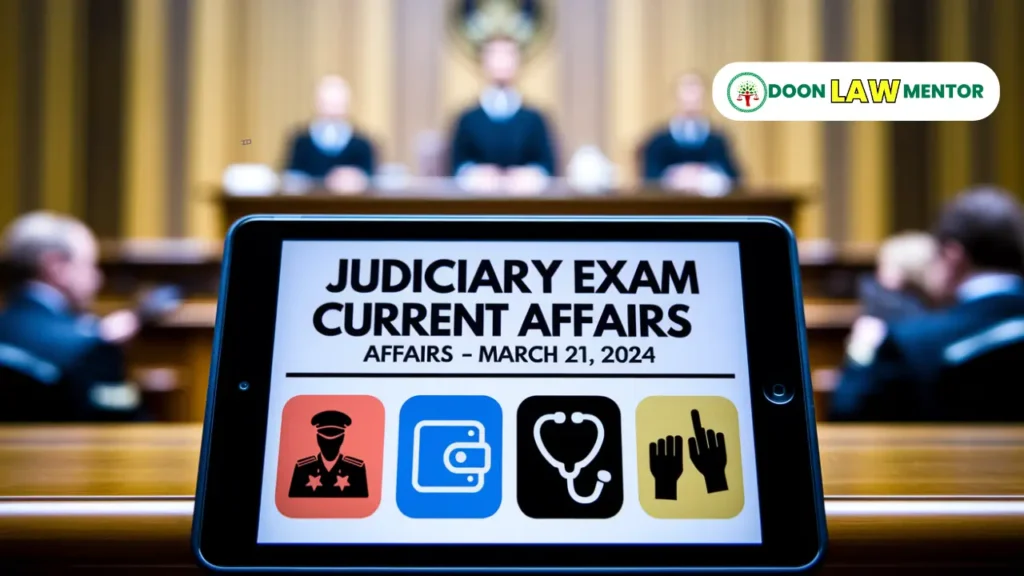Top Current Affairs for Judiciary Exams on 21 March 2024 include major updates like the AFMS-NIMHANS MoU, India AI Mission’s collaboration with the Bill and Melinda Gates Foundation, and SEBI’s partnership with DigiLocker. This blog covers these events and more, helping judiciary aspirants stay informed for their exams.
Table of Contents
Introduction
Staying updated with the top current affairs for judiciary exams is essential for aspirants preparing for competitive law exams. On 21 March 2024, several significant events took place that are relevant for judiciary exam preparation. These include the Armed Forces Medical Services (AFMS) and National Institute of Mental Health and Neurosciences (NIMHANS) signing an MoU to support military personnel, the India AI Mission’s upcoming collaboration with the Bill and Melinda Gates Foundation, and India’s trade agreement with the Maldives to use local currencies.
Other updates, like SEBI’s partnership with DigiLocker and Punjab’s initiative for sign language in its Legislative Assembly, also hold importance. In this blog, we’ll break down these top current affairs for judiciary exams, explain their legal and social impact, and highlight why they matter for law aspirants.
1. AFMS and NIMHANS Sign MoU for Mental Health Support
The Armed Forces Medical Services (AFMS) and the National Institute of Mental Health and Neurosciences (NIMHANS) signed a Memorandum of Understanding (MoU) to enhance mental health support for military personnel and their families. The MoU was signed by Surgeon Vice Admiral Arti Sarin, Director General of AFMS, and Dr. Pratima Murthy, Director of NIMHANS, in the presence of senior officials.
Key Objectives:
- Improve mental health services for military personnel, their families, and dependents.
- Conduct specialized training for medical staff to handle issues like PTSD, anxiety, and depression.
- Promote collaborative research on advanced psychiatric care and faculty exchange programs.
Relevance for Judiciary Exams:
This MoU highlights the growing focus on mental health in India, a topic often discussed in legal contexts under the Mental Healthcare Act, 2017. Judiciary aspirants should note how such collaborations can influence laws related to healthcare rights and the well-being of armed forces personnel, which may appear in exam questions on public health or military law.
2. India AI Mission to Collaborate with Bill and Melinda Gates Foundation
The India AI Mission is set to sign an MoU with the Bill and Melinda Gates Foundation to work on AI solutions for key sectors. This was announced by Ashwini Vaishnaw, Minister of Electronics and IT, after meeting Bill Gates in New Delhi. Jagat Prakash Nadda, Minister of Health and Family Welfare, also met with Gates to discuss healthcare improvements.
Focus Areas:
- Using AI for better crops, stronger healthcare, smarter education, and climate resilience.
- Improving maternal health, immunization, and sanitation through joint efforts.
About the Bill and Melinda Gates Foundation:
- Founded in 2000 by Bill Gates and Melinda French Gates, headquartered in Seattle, USA.
- Led by CEO Mark Suzman, the foundation focuses on reducing poverty, improving health, and expanding access to education and technology globally.
- Notable contributions include funding COVID-19 vaccines, supporting malaria vaccine development, and aiding Gavi, the Vaccine Alliance.
Relevance for Judiciary Exams:
The collaboration reflects India’s push for technology in governance, which is relevant for laws like the Information Technology Act, 2000, and data protection regulations. Aspirants should understand how AI can impact legal frameworks, especially in healthcare and education, as these are often tested in exams under technology and law.
3. India and Maldives to Settle Trade in Local Currencies
India and the Maldives have agreed to settle bilateral trade in their local currencies—Indian Rupees (INR) and Maldivian Rufiyaa (MVR)—alongside the Asian Clearing Union (ACU) mechanism. This follows an MoU between the Reserve Bank of India (RBI) and the Maldives Monetary Authority (MMA).
Impact:
- Strengthens trade and financial ties, with bilateral trade exceeding USD 548 million.
- Benefits the Maldives, where India is the largest trade partner.
About the Maldives:
- Capital: Malé; Currency: Maldivian Rufiyaa (MVR); President: Mohamed Muizzu.
- An island nation in the Indian Ocean, known for its 1,192 coral islands and low elevation.
- Member of the UN, SAARC, and OIC, with Islam as the official religion.
Relevance for Judiciary Exams:
This agreement is significant for international trade law and India’s foreign policy, often covered in judiciary exams. Aspirants should note the role of the RBI and how such agreements align with India’s economic diplomacy under the Foreign Trade (Development and Regulation) Act, 1992.
4. SEBI Partners with DigiLocker to Address Unclaimed Financial Assets
The Securities and Exchange Board of India (SEBI) has partnered with DigiLocker to tackle unclaimed financial assets by enabling investors to store and access demat and mutual fund holdings digitally.
Key Features:
- Access to securities holdings via DigiLocker.
- Nomination facility and automated notifications to nominees.
- Integration with KYC Registration Agencies (KRAs) for verification.
About SEBI and DigiLocker:
- SEBI, established in 1992, regulates India’s securities market, with Madhabi Puri Buch as Chairperson. It protects investors and ensures fair trading practices.
- DigiLocker, launched in 2015 under the Digital India program, provides cloud-based storage for documents like Aadhaar and PAN.
Relevance for Judiciary Exams:
This partnership is relevant for laws like the Securities and Exchange Board of India Act, 1992, and the Digital India initiative. Aspirants should understand how technology is used to protect investor rights, a key topic in financial law questions.
5. Indian Automobile Manufacturers Collaborate with Sri Lanka
The Society of Indian Automobile Manufacturers (SIAM) sent an 18-member delegation to Sri Lanka to enhance cooperation in the automobile sector. They met with Sri Lanka’s Minister of Industry, Sunil Handunneththi, and Deputy Minister Chathuranga Abeysinghe.
Impact:
- Follows Sri Lanka’s relaxation of a vehicle import ban from 2020, easing restrictions under President Anura Kumara Dissanayake.
- Benefits Indian manufacturers like Tata, Maruti Suzuki, and Bajaj, popular in Sri Lanka for affordability.
- Boosts economic ties, creates jobs, and increases government revenue through taxes.
Relevance for Judiciary Exams:
This collaboration highlights India’s role in international trade and economic recovery, relevant for questions on the Foreign Trade (Development and Regulation) Act, 1992, and India-Sri Lanka relations under SAARC.
6. Punjab Becomes First State to Introduce Sign Language in Legislative Assembly
Punjab became the first state in India to introduce sign language in its Legislative Assembly, announced by Minister Baljit Kaur.
Objective:
- Ensure accessible communication for persons with disabilities under Section 40 of the Rights of Persons with Disabilities (RPWD) Act, 2016.
- Broadcast key sessions like the Governor’s Address and Budget in sign language.
Significance:
- Promotes inclusivity for the deaf and hard of hearing.
- Aligns with global efforts, like the International Day of Sign Languages on September 23.
Relevance for Judiciary Exams:
This initiative is directly linked to the RPWD Act, 2016, a key topic in exams. Aspirants should note landmark judgments like Justice Sunanda Bhandare Foundation v. Union of India (2014), which emphasized accessibility for persons with disabilities, reinforcing the legal basis for such measures.
7. Mizoram Launches Universal Healthcare Scheme
Mizoram Chief Minister Lalduhoma launched the Mizoram Universal Healthcare Scheme to provide cashless and paperless healthcare coverage.
Key Features:
- Covers government employees, civil pensioners, and the general public up to ₹5,00,000.
- Funded initially by a loan from the Asian Development Bank (ADB), with ₹14.50 crore allocated to clear bills.
- Annual registration fee of ₹2,500 per family.
Relevance for Judiciary Exams:
This scheme relates to the right to health under Article 21 of the Constitution, often tested in exams. The landmark case Paschim Banga Khet Mazdoor Samity v. State of West Bengal (1996) established that access to healthcare is a fundamental right, making such schemes legally significant.
8. Union Cabinet Approves ₹1,500 Crore Scheme for BHIM-UPI Transactions
The Union Cabinet approved a ₹1,500 crore scheme to promote low-value BHIM-UPI transactions (up to ₹2,000) for FY 2024-25.
Key Features:
- 0.15% incentive per transaction, with zero Merchant Discount Rate (MDR).
- Targets ₹20,000 crore in transaction volume, focusing on small merchants in rural areas.
Relevance for Judiciary Exams:
This scheme aligns with the Digital India initiative and financial inclusion, relevant for laws like the Payment and Settlement Systems Act, 2007. Aspirants should note how digital payments impact economic laws and consumer rights.
9. Adani Group’s ‘Skill and Employ’ Initiative
The Adani Group launched India’s largest ‘Skill and Employ’ program in partnership with the Indo-German Chamber of Commerce (IGCC).
Key Features:
- Focuses on green energy, manufacturing, and high-tech sectors.
- ₹2,000 crore investment to establish a finishing school in Mundra, Gujarat.
- Targets students from technical and vocational backgrounds for industry-ready training.
Relevance for Judiciary Exams:
This initiative relates to labor laws and skill development under the Apprentices Act, 1961. The case State of Gujarat v. Hon’ble High Court of Gujarat (1998) emphasized the importance of rehabilitation through skill training, making this program legally relevant.
10. ₹10,600 Crore Urea Complex in Namrup, Assam
The Union Cabinet approved a ₹10,600 crore Brownfield Ammonia-Urea Complex in Namrup, Assam, with a capacity of 12.7 lakh metric tonnes annually.
Joint Venture:
- 40% Assam Government, 11% Brahmaputra Valley Fertiliser Corporation Ltd (BVFCL), and others.
- Expected to create jobs and enhance fertiliser security in the Northeast.
Relevance for Judiciary Exams:
This project aligns with economic policies and self-reliance, relevant for questions on industrial laws like the Industries (Development and Regulation) Act, 1951. It also ties to environmental laws due to its impact on agriculture.
Conclusion
The top current affairs for judiciary exams on 21 March 2024 cover a wide range of topics, from mental health support for military personnel to digital payment incentives and healthcare schemes. Events like the AFMS-NIMHANS MoU, SEBI-DigiLocker partnership, and Punjab’s sign language initiative highlight India’s focus on inclusivity, technology, and governance. For judiciary aspirants, these updates are crucial for understanding laws like the RPWD Act, 2016, the IT Act, 2000, and Article 21’s right to health. Staying informed about these top current affairs for judiciary exams will help aspirants excel in their preparation and understand the evolving legal landscape.
Call-to-Action
Want to stay updated on the top current affairs for judiciary exams? Join Doon Law Mentor’s Courses for expert guidance and study materials! Follow @doonlawmentor on Instagram for the latest updates!
FAQs
- What are the top current affairs for judiciary exams on 21 March 2024?
The top current affairs for judiciary exams include the AFMS-NIMHANS MoU, India-Maldives trade agreement, and SEBI-DigiLocker partnership, among others. - What is the AFMS-NIMHANS MoU about?
It aims to enhance mental health support for military personnel through training, research, and psychiatric care programs. - Which foundation is collaborating with the India AI Mission?
The Bill and Melinda Gates Foundation will work on AI solutions for healthcare, education, and climate resilience. - What is the India-Maldives trade agreement?
India and the Maldives will settle bilateral trade in INR and MVR, boosting economic ties. - How does the SEBI-DigiLocker partnership help investors?
It allows investors to store and access demat holdings digitally, reducing unclaimed financial assets. - What did Punjab do for persons with disabilities?
Punjab became the first state to introduce sign language in its Legislative Assembly, aligning with the RPWD Act, 2016. - What is the Mizoram Universal Healthcare Scheme?
It provides cashless healthcare coverage up to ₹5,00,000, as per the right to health under Article 21. - What is the ₹1,500 crore BHIM-UPI scheme?
It promotes low-value UPI transactions with incentives, supporting financial inclusion under the Digital India initiative. - What is the Adani Group’s ‘Skill and Employ’ program?
It trains students for industries like green energy, aligning with skill development laws like the Apprentices Act, 1961. - Where is the new urea complex being set up?
The ₹10,600 crore Brownfield Ammonia-Urea Complex is being set up in Namrup, Assam, to boost fertiliser production.
#JudiciaryExams, #CurrentAffairs2024, #LegalUpdates, #LawAspirants, #IndiaLaw #doonlawmentor



